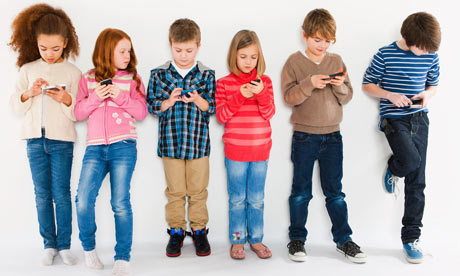
Robert McCrum asks writers some searching questions about where the literature of new technology is to be found. He makes an important point: in an age when many of us email, message, tweet, comment, like, pin, reblog, and update more than we talk, just why is it that the books and ebooks on the shelves of Amazon are still dominated by "spoken" dialogue?
But look closer and the questions are confused. More to the point, they are symptomatic of a trend that should worry those who scour the literary pages for a survey of reading material. "I cannot think of a contemporary scene or character whose narrative or development owes much, if anything, to the new technology," writes McCrum and I can't help feeling that he's looking in the wrong place. Or worse, not looking at all.
The line McCrum subsequently pursues highlights the problem he isn't getting to grips with. He follows the development of the narrative mind from linear to fragmentary, continuous to overlapping, unidirectional to scattershot. Rather unhelpfully he then makes points about Gutenberg before asking about the potential for this new narrative mind to produce something as yet absent from culture, "the first genuine e-novel". I say unhelpfully because this seems to me a rather unfair attempt to wire three unconnected strands – the novel, linear narrative, and the movable type/digital analogy – into a single plug, missing the marks of 18th-century leisure at one end and troubadour romances at the other by a couple of hundred years apiece.
McCrum's fallacy can be summed up very simply. If you want to argue that new technology has interrupted a way of thinking that worked through its own particular literary form, the novel, and you want to find literature emergent from that form, it might be best not to restrict your search to novels.
There is a wealth of wonderful literature springing from and reflecting upon the tangential mind for want of a better term. A lot of it (though by no means all – see Dennis Cooper's 2005 novel The Sluts and Amy Marcott's heartbreaking short story Flying the Coop) is poetry, though for all her prognostications Carol Ann Duffy would probably spit Soave on her stanzas at the sight of some of it.
Illustrative of the playfulness of the internet is flarf, a genre that cuts and pastes found internet phrases into new works like Anna Hobson's Tales Of Modern Courtship Part Three: First Impressions, a collage of statuses taken from an internet dating site.
Indeed, rather like a lot of music, manipulation of source material into something that transcends, questions, or interrupts in some way the source, or our assumptions about it, is something common to much alt lit (the umbrella term for a lot of these practices). Take Steve Roggenbuck's ebook DOWNLOAD HELVETICA FOR FREE.COM, which takes 100 excerpts from MSN Messenger and presents them in Helvetica font. Or Sian Rathore's ebook The Geisha Series, for which she plugged words of her choosing into sentence-generating software and pasted the results on to stock photos.
Encapsulating the subtle tensions and hermeneutic spirals within alt lit, and its capturing of and commentary on the tangential mind, is James Ganas's stunning ebook James Ganas Was My Best Friend and I'm Sorry He Died So Young of Cancer, pieced together from the fabricated flotsam of a semi-fictitious virtual life, such as this exquisite status:
People will remember me more for my online presence
Than how i interacted with them in real life
I frequently share pictures and like status updates
In this way i give back to the community
And forge unbreakable bonds
McCrum wants to look to novels for reflections on the way the internet impacts on our lives. But that method fails to shake the old hegemony of the linear it purports to be questioning. The novel is by no means spent, and is by no means redundant as a means of questioning the new matrices of community that shoot in all directions from the web, but the literary revolution, if there is one, will happen in forms that allow for reflection, anxiety, hope, experiment, play, comment, criticism, writers and texts to shuttle horizontally amongst themselves, and the paths that alt lit is beginning to explore allow that to happen. As such they offer a more complete and subtle portrait of the modern mind that receives, edits, samples, remixes, reformulates and sends a semiotic hailstorm boomeranging into the ether.
Of course, if the literary media is going to start bringing these forms to readers, it first needs to get over three of its biggest qualms. Almost all of this material is self-published. Most of it is free. And whilst much has been redacted, very little has been edited in a way most commentators would recognise.

